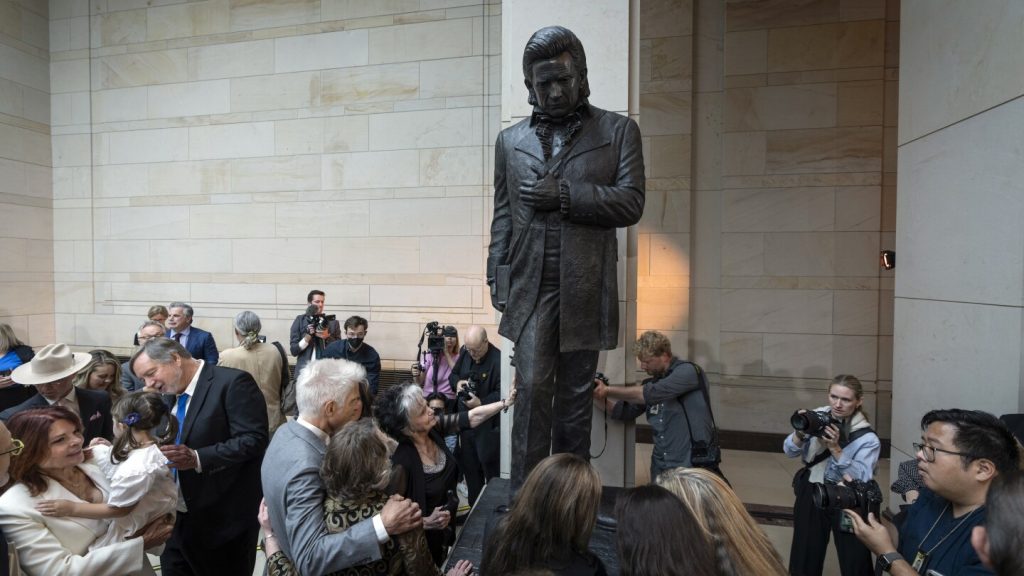Johnny Cash, the iconic musician known as “The Man in Black,” has made history by becoming the first professional musician to be honored with a statue in the U.S. Capitol. The unveiling ceremony of the statue took place with Congressional leaders from both parties and members of the Cash family in attendance. House Speaker Mike Johnson emphasized the importance of recognizing musicians like Cash who have used their voices to represent the struggles and triumphs of everyday Americans. The statue of Cash, created by Little Rock sculptor Kevin Kresse, portrays him with a guitar slung across his back and a Bible in his hand, symbolizing his musical and spiritual influences.
The state of Arkansas, Cash’s birthplace, made the decision to replace two existing statues in the Capitol with new ones depicting more relevant figures. In addition to Cash, another statue portraying civil rights leader Daisy Bates was unveiled earlier this year. Bates played a significant role in the desegregation of Little Rock Central High School in 1957, reflecting Arkansas’ commitment to honoring individuals who have made a lasting impact on American history. The selection of Cash as a representative of the state acknowledges his contributions as a storyteller and musician who transcended genres with his songs like “I Walk The Line” and “Ring of Fire.”
Political leaders and artists alike praised Cash’s legacy and influence on American music and culture during the unveiling ceremony. Democratic leader Hakeem Jeffries commended Cash for inspiring generations of artists with his “substance” and “swagger,” quoting other musicians like Bob Dylan and Snoop Dogg who admired Cash’s work. Arkansas Gov. Sarah Huckabee Sanders, who led a group of lawmakers at the ceremony, highlighted Cash’s authenticity and resilience in the face of personal struggles. Cash’s daughter, Rosanne Cash, expressed her belief that her father would have considered the statue in the Capitol as the ultimate honor, reflecting his admiration for America as a place of dreams and refuge.
Johnny Cash’s life story, from his humble beginnings in a small town in Arkansas to his global success as a musician, is a testament to the power of perseverance and redemption. Despite facing challenges like addiction, Cash channeled his experiences into his music and performances, connecting with audiences around the world. His daughter described him as a “living redemption story” who faced darkness with love and faith. Cash’s impact on multiple genres, including country, rock, blues, folk, and gospel, is evident in his record sales and inductions into both the Country Music Hall of Fame and the Rock & Roll Hall of Fame.
The recognition of Johnny Cash with a statue in the U.S. Capitol serves as a tribute to his lasting impact on American music and culture. By honoring his legacy alongside other figures in American history, Cash’s statue represents the diversity and richness of storytelling in the country. As one of the most influential musicians of his time, Cash’s presence in the Capitol symbolizes the importance of artistry and creativity in shaping the nation’s identity. With the unveiling of his statue, Cash’s contributions to the music industry and his ability to connect with audiences across generations are celebrated and commemorated for future visitors to the Capitol to appreciate.
Johnny Cash’s statue joins the ranks of other iconic figures in the U.S. Capitol, including politicians, trailblazers, and activists, solidifying his place in American history. The legacy of Cash, as a musician who used his platform to give voice to the struggles and triumphs of everyday Americans, is now immortalized in the halls of the Capitol. Through his music, storytelling, and resilience, Cash’s statue stands as a reminder of the power of art to inspire, heal, and unite people from all walks of life. As visitors pass by his statue, they will have the opportunity to reflect on Cash’s contributions to American culture and the enduring impact of his music on the world.


